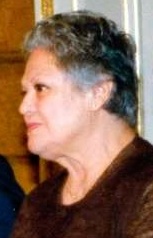Emma Penella

Emma Penella | |
|---|---|
 Penella in 1996 | |
| Born | Manuela Ruiz Penella 2 March 1931 Madrid, Spain |
| Died | 27 August 2007 (aged 76) Madrid, Spain |
| Occupation | Actress |
| Spouse | |
| Father | Ramón Ruiz Alonso |
| Relatives |
|
Manuela Ruiz Penella (2 March 1931[1] – 27 August 2007), better known as Emma Penella, was a Spanish film and television actress.[2]
Biography
[edit]Manuela Ruiz Penella was born on 2 March 1931 in Madrid, the child of far-right politician Ramón Ruiz Alonso and actress Magdalena Penella Silva, thus she was also the granddaughter of actor Manuel Penella Moreno.[3][4][5] Her younger sisters Elisa ("Elisa Montés") and Teresa ("Terele Pávez") also followed the family's acting footsteps.[5] The three sisters renounced to using the Ruiz family name as an artistic name, in the wake of their father's involvement in the murder of Federico García Lorca.[5][6]
She featured in the 1952 film The Eyes Leave a Trace, ensuingly landing a larger degree of recognition with her performance in The Executioner.[6]
She was named best actress by the Círculo de Escritores Cinematográficos for Sentencia contra una mujer in 1962.[7]
In 1967, Emma Penella married producer Emiliano Piedra (died 1991).[8]
She died on 27 August 2007 at aged 76 by a sepsis caused due to her diabetes.[9][10][11]
Selected filmography
[edit]- The Eyes Leave a Trace (José Luis Sáenz de Heredia, 1952).
- Carne de horca (Ladislao Vajda, 1953).
- What Madness! (1953)
- Doña Francisquita (Ladisalo Vajda, 1953)
- Cómicos (Juan Antonio Bardem, 1953).
- Adventures of the Barber of Seville (1954)
- The Red Fish (José Antonio Nieves Conde, 1955).
- Fedra (Manuel Mur Oti, 1956).
- The Battalion in the Shadows (Manuel Mur Oti, 1956).
- De espaldas a la puerta (José María Forqué, 1956).
- Back to the Door (1959)
- Sentencia contra una mujer (1960)
- El Verdugo (Luis García Berlanga, 1963).
- Fortunata y Jacinta (Angelino Fons, 1963).
- Golden Goddess of Rio Beni (1964)
- La regenta (Gonzalo Suárez, 1975).
- Padre nuestro (Francisco Regueiro, 1985).
- El Amor brujo (Carlos Saura, 1986).
- La estanquera de Vallecas (Eloy de la Iglesia, 1986).
- Doblones de a ocho (Andrés Linares, 1990).
- Mar de luna (Manolo Matji, 1994).
- Pídele cuentas al rey (1999).
- Los novios búlgaros (Bulgarian Lovers) (Eloy de la Iglesia, 2003).
- Aquí no hay quien viva (2003–2006) TV series
- La que se avecina (2007) TV series
References
[edit]- ^ Marvin D'Lugo (1 January 1997). Guide to the Cinema of Spain. Greenwood Publishing Group. pp. 250–. ISBN 978-0-313-29474-7.
- ^ "Vital Emma Pennella". ABC (in Spanish). Madrid: Vocento. 14 July 1973. p. 66. Retrieved 30 July 2018.
- ^ Belategui, Oscar L. (28 August 2007). "Emma Penella, la gruñona entrañable". Diario Sur.
- ^ Reina Corbacho, Francis (4 June 2021). "La historia compartida entre Federico García Lorca y Emma Penella". El Salto.
- ^ a b c "Emma Penella: cómo logró su papel en 'ANHQV' y el vínculo de su familia con el asesinato de Lorca". Cadena COPE. 23 December 2021.
- ^ a b Expósito, José Manuel (27 August 2016). "9 cosas que no sabías de Emma Penella".
- ^ "Spain's Own 'Bests' Include 'Placido'". Variety. 11 April 1962. p. 5.
- ^ Martínez Torres, Augusto (30 August 1991). "Muere Emiliano Piedra, uno de los grandes impulsores del cine español". El País.
- ^ EFE (27 August 2007). "Fallece a los 76 años la actriz Emma Penella". El País (in Spanish). Madrid. Retrieved 30 July 2018.
- ^ EFE (27 August 2017). "Muere la actriz Emma Penella a los 76 años". 20 Minutos (in Spanish). Retrieved 30 July 2018.
- ^ Galán, Diego (28 August 2007). "Muere una actriz de raza y voz rota". El País (in Spanish). Madrid. Retrieved 30 July 2008.